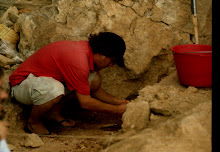A Sum Greater Than Its Parts: Multi-Disciplinary Perspectives on Later Human Evolution
Room: Imperial A
Date/time: Saturday Nov. 17, 2012, 1:45-5:15
Session Abstract:
In
anthropology departments across the country- as in the field as a
whole- the boundaries between the sub-fields of the discipline are often
being drawn more starkly than ever. This reflects the ongoing debates
about scientific vs. humanistic
anthropologies as well as the increasing specialization of knowledge
required for successful scholarship. And yet, even in the face of the
increasing fractionation of our field, certain avenues of
anthropological inquiry are actually becoming more multi-disciplinary
in nature. A particularly noteworthy example is found in the study of
later human evolution. Researchers from an array of
fields—paleoanthropology, archaeology, behavioral and evolutionary
ecology, genetics, linguistics, cognitive psychology, and
primatology—produce
independent and overlapping datasets that address the behavioral and
biological evolution of our species. It is only by embracing the
contribution of scholars across sub-field- and disciplinary- boundaries
that the complexity of recent human evolution can
be understood.
The purpose of this session is to bring together scholars who
approach the study of human evolution from different perspectives, both
to demonstrate the unique contributions being made by the disciplines
represented, and as a means of highlighting the
critical importance of collaborative work to a more deeply nuanced
understanding of the later evolution of our species.
2:45 PM
3:15 PM - Break
4:30 PM
5:00 PM

No comments:
Post a Comment